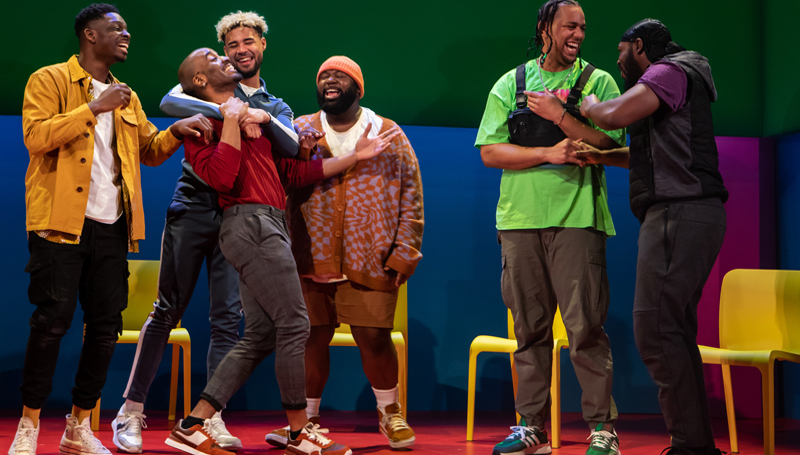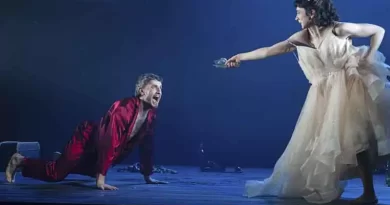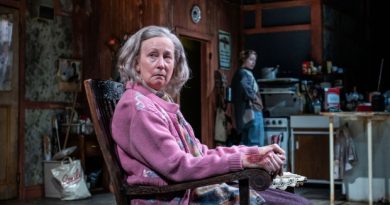“For Black Boys Who Have Considered Suicide When the Hue Gets Too Heavy”, Apollo Theatre
Mark Shenton in the West End
3 April 2023
David Hare recently wrote a diary column for The Spectator (https://www.spectator.co.uk/article/musicals-are-killing-theatre/) that was headlined “Musicals are killing theatre”. In it, he expressed his dismay that “squatting” (to use his word) at Wyndham’s Theatre – once home to a National Theatre transfer of his play Skylight – was the current transfer of Oklahoma! from the Young Vic, which he dismisses as “the one the profession nicknames Wokelahoma”. And he writes, “It’s a crushing defeat to see Wyndham’s without a straight play. Is it our fault? Are dramatists not writing enough good plays which can attract 800 people a night? Will well-known actors not appear in them? Or did producers mislay their balls during lockdown?”

The ensemble. Photo credit: Ali Wright.
What would he think if he wandered up Shaftesbury Avenue, though? Perhaps he’d be similarly affronted that occupying the Apollo isn’t a well-made play by one of the dead white men, but a vibrant, non-linear play by Ryan Calais Cameron, performed by a stunning ensemble of six non-white British actors, to a responsive black-majority audience that are being drawn to a work that speaks specifically of and to them. (I’ve only rarely experienced a similar feeling as a white playgoer of being in a minority in a theatre, and it’s a massively welcome step.)
First seen at the New Diorama Theatre in 2021 and then at the Royal Court last year, For Black Boys Who Have Considered Suicide When the Hue Gets Too Heavy well deserves its West End transfer. Here’s a play – maybe more of an experience than a traditional play – that’s easily capable of attracting 800-plus people a night, but which doesn’t need or have well-known actors appearing in it. (The cast collectively won the best performer in a play category at The Stage Debut Awards in 2022 and were jointly nominated for an Olivier Award; they are now making their West End debuts here.)
And amongst the producers who’ve found their collective “balls”, as Hare puts it, are several key players who don’t actually have any, including Nica Burns, Jane Featherstone, Elisabeth Murdoch, Yvonne Yates, and Sarah Verghese. In fact, there’s only one non-institutional biological male on the list, David Yates.

The ensemble.
Photo credit: Ali Wright.
This is, then, that truly rare thing: a genuinely ground-breaking occasion on multiple fronts.
Yes, it does have a certain rawness – or maybe that should be aliveness – in its slightly self-conscious structure of this sextet of men, who initially seem to be in some kind of group therapy session, sharing their stories and experiences with each other.
But it also has a cumulative power and sense of theatricality that’s constantly engaging and, at times, downright thrilling. Using the simplest of staging techniques, it strips the storytelling down to its core elements of words and movement, lights and music, with no props and the most basic of unit sets, with a platform built above a metal scaffolding frame to provide a second level for the actors to perform from.
Instead, we focus on a series of monologues and duologues in which these men discuss subjects both familiar and universal in their humanity (the presence, or absence, of fathers, for example; and memories of their first sexual experiences, that range from nine years old upwards; but there is also a searing account of a 14-year-old whose life is cut drastically short by sudden knife violence and uncomfortable interactions with police officers that could sadly be plucked from most newspapers on a daily basis. Also visibly engendering a degree of discomfort in some members of the audience is a sequence acknowledging gay black experience (“homosexuality”, someone says, “is a white man’s perversion” – as the Tony and Pulitzer Prize winning show A Strange Loop, getting its London premiere at the Barbican this summer, proves, this is hardly the case).
The play was inspired by the landmark 1976 show for colored girls who have considered suicide / when the rainbow is enuf, which its creator Ntozake Shange dubbed a “choreopoem”; the director of last year’s Broadway revival defined this “a combination of all forms of theatre storytelling”. Ryan Calais Cameron, who also directs his own play here, achieves a similar fusion of text and music, with movement direction provided by Theophilus O. Bailey. Cameron and Bailey are impeccably served by their ensemble cast of Mark Akintimehin, Emmanuel Akwafo, Nnabiko Ejimofor, Darragh Hand, Aruna Jalloh, and Kaine Lawrence, who feel as if they breathe and move as one, yet also reveal finely delineated personalities.
It’s a bold production for the West End right now where producers, coming back from Covid closures, are mostly playing safe; but a few are taking the opportunity to throw caution to the wind with shows like this and My Son’s a Queer (But What Can You Do?). I sincerely hope it pays off, in every sense.
~









